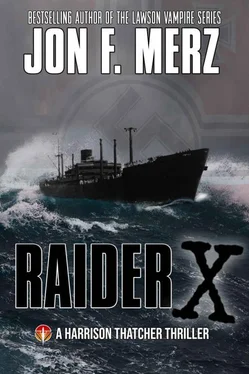“Eventually?”
Schwarzwalder steered them toward an outside deck and then followed the steps leading down toward the stern. “I have other matters to attend to first.”
By the rear of the vessel, Thatcher saw what remained of the five bodies wrapped in the flag of Germany. He found it interesting to note that the flags did not have the swastika on them. He mentioned this to Schwarzwalder who shook his head. “This is a German naval vessel, not an instrument of the SS. I would prefer to keep it that way as much as I am able. I answer to the High Command, not one of those crazy zealots.”
Thatcher stayed back while Schwarzwalder addressed the sailors that had gathered to send their comrades off to burial at sea. He spoke of their competence and their loyalty, praising them for their work ethic during these trying times. It was a speech of gratitude for their bravery and service, but also one of the need to keep their memory alive by doing their jobs as best they could given their deceased comrades and how well they had done theirs.
When he was finished, Schwarzwalder mentioned a bit of brief prayer and then ordered the bodies consigned to the deep. One by one, each sailor was slid overboard with a splash that barely echoed amid the churning motors of the ship itself. They couldn’t afford to pause in their journey even for a few minutes; it was vital they reach their operational grounds before any Allied ships were able to hunt them down. And they still had a very long way to go.
Schwarzwalder and his men stood there in silent respect for another five minutes until Thatcher felt that it might have become awkward had it carried on much longer. Then Schwarzwalder dismissed the men and told them to get back to work. As he came back toward Thatcher, he was interrupted by another officer who asked to speak with the Captain. They had a huddled conversation for several minutes and the officer gave Schwarzwalder something that Thatcher could not see.
When he left, Schwarzwalder approached Thatcher. He held up the item and Thatcher could see it was a piece of bone. He grimaced. “Is that what I think it is?”
The Captain nodded. “The ship’s doctor performed as much of a post-mortem as he could, which is to say, it wasn’t very thorough given the condition of the deceased. Still, he did have something to report that he couldn’t quite explain.”
Thatcher pointed at the bone. “And it has to do with that?”
Schwarzwalder handed it to him. “Take a look. What do you see?”
Thatcher turned the bone fragment over in his hand. It was roughly six inches long and two inches at its widest point. The bone fragment had been cleaned, that much was obvious because it was no longer discolored by blood or gristle. As Thatcher turned it over in his hand, he marveled at how light it was but he didn’t think that was what Schwarzwalder was referring to so he peered closer. The core of the bone was hollow. Thatcher stopped. He looked at Schwarzwalder. “Where’s the middle part of the bone?”
“The marrow is the word you’re looking for I believe,” said Schwarzwalder. “And that is precisely the point. There is none. According to the doctor, none of the bones he recovered had any, either.”
Thatcher shook his head. “What does that mean? Whoever killed these men did so for their bone marrow? That’s the reason the scene in the engine room was such complete and utter slaughter?”
“It makes no real sense,” said Schwarzwalder. “But that appears to be the case. If the bones are missing their marrow then one can only assume that was the goal of the killing itself: to obtain it.”
Thatcher sighed. “Why would anyone want marrow, though?”
Schwarzwalder shook his head. “I do not know. The doctor tells me that marrow is considered the source of certain blood cells. Perhaps that is the reason. But I do not pretend to have any real theory why anyone would want it. Let alone what they would do with it.”
Thatcher leaned against the nearby railing. “Let’s give some air to your theory about Cyra. Suppose she did kill Adamson-”
“That seems highly likely.”
Thatcher nodded. “I’m not arguing that point. She certainly had the means to do so. But one does not necessarily equate to the other.”
“But it does make it more likely than not.”
“Perhaps,” said Thatcher. “But what if there is something else aboard this ship that killed those men? Cyra’s cabin is guarded day and night.”
“Speaking of which,” said Schwarzwalder. “What happened to Steinkopf? He was with you up until we got to Cyra’s cabin. Then he vanished.”
Thatcher shook his head. “To be honest, I didn’t even notice.”
“In any event, you are correct: she is guarded day and night. There is no way for her to get out of that cabin without being seen. Unless she is somehow able to shrink herself down and exit through the porthole.”
Thatcher smiled. “Which we both know is utterly ridiculous.”
But Schwarzwalder didn’t comment on that. He paused and looked out at the ocean. “You know, I have always found the sea the source of security. Whenever I think about whatever problems may plague me, I simply stare at the ocean and they seem to vanish. There is serenity in its tempestuousness that I find reaffirming somehow. In some way, perhaps I find it to be a mirror of life; in all of its chaos, there is still a rhythm to it that can be used to soothe almost anything.”
“Perhaps except to find a killer,” said Thatcher. “After all, I too have guard on my cabin door.”
Schwarzwalder grinned. “Yet, here you stand.” He held up a hand. “I do not care that you are here with me. To be honest, I find your company welcome especially as I struggle to solve this barbaric crime.”
“Well, thanks. Please don’t give Steinkopf too much grief. Maybe he had to go to the bathroom or something.”
“Perhaps,” said Schwarzwalder. “No, there is no method that we know of for someone to shrink themselves down and exit through a porthole. That I know in as much as I have ever seen to be true. But what if someone has figured out how to do it?”
Thatcher shrugged. “But how? You would need to figure out how to alter mass, shape, size, body weight… it’s too fantastic to give credence to.”
“When one eliminates the impossible, what must be left is the possible, right?”
Thatcher grinned. “Supposedly.”
“What if the reverse is true? What if one eliminates the possible? What is left can only be the impossible.”
“Meaning?”
“Meaning just what we said. Cyra’s cabin is guarded day and night. She cannot simply open the door and leave to do her killing. The guard would hear her and report the fact that she tried to leave. Which would be difficult because her door is also locked. There are no other doors that would provide her with an exit. Therefore, the one thing that would is the porthole. As impossible as it seems, that must be how she is leaving the room. Somehow, some way, she is able to do so — as impossible as it seems to both of us.”
Thatcher frowned. “You realize we’re delving into science fiction here if indeed that is the case.”
Schwarzwalder shook his head. “We’re delving into science non-fiction if indeed that is what is happening. We must be willing to consider it; we cannot afford not to at this moment simply because we do not possess a more palatable theory.”
Thatcher sighed. “You’re correct, of course. It’s just all so bizarre.”
“As impossible as it may seem, the deaths of five of my men are as real as you and I and we must confront that fact.”
Thatcher eyed him. “But only if we are correct: that Cyra is indeed the killer.”
Читать дальше












